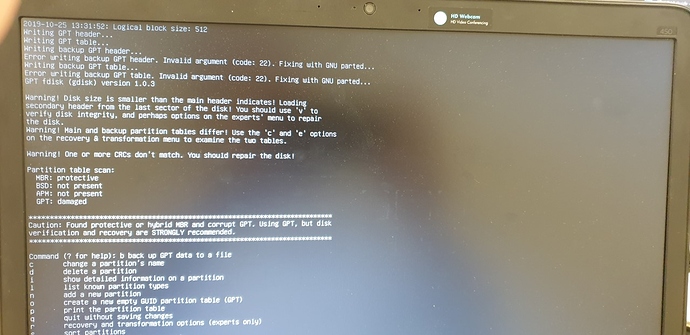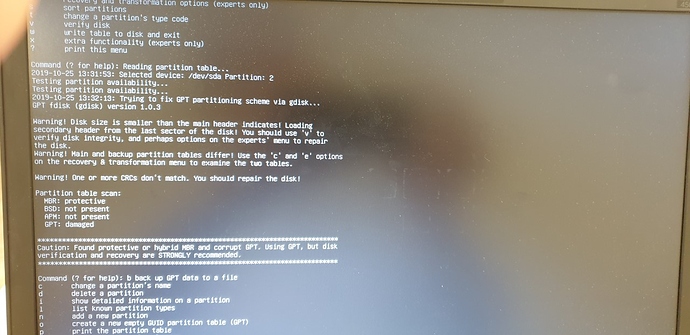Hello
Ok, thanks that was it.
It was ~480GB drives, i didnt expected us to still have laptops with mecanical drives.
Usually it s now ~250gb ssd
filesystem/partition/disk resize seems to be possible using libguestfs.
- Use virt-df to view the VM’s disk filesystem details
(prod)root@host:/var/lib/libvirt/images/maas-01.prod.setup# virt-df system.qcow2
Filesystem 1K-blocks Used Available Use%
system.qcow2:/dev/sda1 1451481468 2405216 46935740 5%
- Use guestfish to modify the guest VM’s filesystem.
(prod)root@host:/var/lib/libvirt/images/maas-01.prod.setup# guestfish -a system.qcow2
><fs>run
><fs>e2fsck-f /dev/sda1
><fs>resize2fs-size /dev/sda1 20G
><fs>quit
virt-resize --shrink PART
Shrink the named partition until the overall disk image fits in the destination. The named partition must contain a filesystem or PV which has already been shrunk using another tool (eg. guestfish(1) or other online tools). Virt-resize will check this and give an error if it has not been done.
The amount by which the overall disk must be shrunk (after carrying out all other operations requested by the user) is called the “deficit”. For example, a straight copy (assume no other operations) from a 5GB disk image to a 4GB disk image results in a 1GB deficit. In this case, virt-resize would give an error unless the user specified a partition to shrink and that partition had more than a gigabyte of free space.
Note that you cannot use –expand and –shrink together.
Currently virt-resize can resize:
- ext2, ext3 and ext4 filesystems.
- NTFS filesystems, if libguestfs was compiled with support for NTFS.The filesystem must have been shut down consistently last time it was used. Additionally, ntfsresize(8) marks the resized filesystem as requiring a consistency check, so at the first boot after resizing Windows will check the disk.
- LVM PVs (physical volumes). virt-resize does not usually resize anything inside the PV, but see the –LV-expand option. The user could also resize LVs as desired after boot.
- Btrfs filesystems, if libguestfs was compiled with support for btrfs.
- XFS filesystems, if libguestfs was compiled with support for XFS.
- Linux swap partitions.Please note that libguestfs destroys the existing swap content by recreating it with
mkswap , so this should not be used when the guest is suspended.
- f2fs filesystems, if libguestfs was compiled with support for f2fs.
“unknown/unavailable method for expanding the TYPE filesystem on DEVICE/LV”
Virt-resize was asked to expand a partition or a logical volume containing a filesystem with the type TYPE , but there is no available nor known expanding method for that filesystem.
This may be due to either of the following:
- There corresponding filesystem is not available in libguestfs, because there is no proper package in the host with utilities for it. This is usually the case for
btrfs , ntfs , xfs , and f2fs filesystems.Check the results of:
virt-resize --machine-readable
guestfish -a /dev/null run : available
guestfish -a /dev/null run : filesystem_available TYPE
In this case, it is enough to install the proper packages adding support for them. For example, libguestfs-xfs on Red Hat Enterprise Linux, CentOS, Debian, Ubuntu, and distributions derived from them, for supporting the xfs filesystem.
2. Virt-resize has no support for expanding that type of filesystem.In this case, there’s nothing that can be done to let virt-resize expand that type of filesystem.

